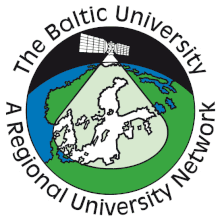Baltic University Programme
The Baltic University Programme (BUP) strives since its foundation in 1991 to find novel ways of interaction among universities by promoting openness, internationalization and mobility. The main aim is to support building strong regional educational and research communities. It is a network of about 89 member universities and other institutes of higher education in the Baltic Sea Region.

The member universities are located within or partly within the drainage area of the Baltic Sea, including Belarus, Estonia, Finland, Germany, Latvia, Lithuania, Poland, Russia, and Sweden. Countries near the basin are also represented - Czech Republic, Slovakia, and Ukraine. In each country, a national centre provides the local contacts within the Programme. The national centres are also responsible for content and arrangement of the BUP events in a half-year rotation presidency within the Programme. It is governed by an international board[1], and coordinated by the Baltic University Programme Secretariat at Uppsala University, Sweden.
Footnotes
- Walter Leal Filho (2002). Prospects of Integration and Development of R & D and the Innovation Potential of Black Sea Economic Co-operation Countries. IOS Press. ISBN 978-1-58603-263-0.